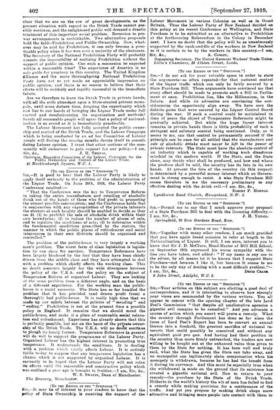[To THE EDITOR OF THE " SPECTATOR.") SIR,—It is good
to hear that the Labour Party is likely to apply itself seriously to the problem of the administration of the Liquor Trade. On June 28th, 1918, the Labour Party Conference resolved:— " That the Conference sees the key to Temperance Reform in taking the entire manufacture and retailing of alooholic drink out of the hands of those who find profit in promoting the utmost possible consumption; and the Conference holds that in conjunction with any expropriation of the private interests the electors of each locality should be enabled to decide as they see fit (1) to prohibit the sale of alcoholic drink within their own boundaries; (2) to reduce the number of places of sale, and to regulate the conditions of sale; (3) to determine within the fundamental conditions prescribed by the statute, the manner in which the public places of refreshment and social intercourse in their own districts should be organized and controlled."
The problem of the public-house is very largely a working man's problem. The worst form of class legislation is legisla- tion by one class for another. Temperance Reformers have been largely hindered by the fact that they have been chiefly drawn from the middle class and they have attempted to deal with a problem which chiefly affects the working class. This no doubt accounts largely for the wide divergence 'between the policy of the U.K.A. and the policy on the subject of Temperance Reform of organized Labour. They are looking at the same problem from a different angle, and on the basis of a different experience. For the working man the public- house is a social necessity. The State has so far handled the problem that it has provided (and drawn profit from) a thoroughly bad public-house. It is really high time that we made up our minds between the policies of "mending " and " ending." Prohibition is not at the present time a possible policy in England. It remains that we should mend the public-house, and make it a place of reasonable /social (relaxa- tion and refreshment. Experience has already shown that this is perfectly possible, but not on the basis of the private owner- ship of the Drink Trade. The U.K.A. will no doubt continue to plough its lonely furrow. Temperance Reformers in general will do well to support the programme of the Labour Party. Organized Labour has the highest interest in promoting true temperance. It understands the conditions. It is dealing with a problem which vitally affects Labour. It is entirely futile to-day to suppose that any temperance legislation has a chance which is not supported by organized Labour. It is earnestly to be hoped that the Labour Party will not relax its efforts until the reasonable and constructive policy which was outlined a year ago is brought to fruition.—I am, Sir, &o.,
W. S. SWAYNE, Dean of Manchester: The Deanery, Manchester.


































 Previous page
Previous page